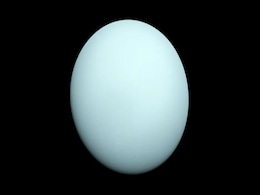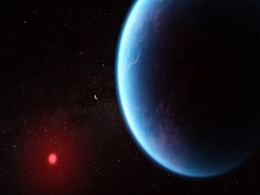Exoplanetary Science
- All
- News
-

Uranus Found Emitting Internal Heat, Reviving Hopes for Flagship NASA Mission
- Thursday July 17, 2025
- Written by Gadgets 360 Staff
Astronomers have discovered that Uranus emits 12% more heat than it receives from sunlight, contradicting past data from Voyager 2. The internal warmth likely comes from leftover energy in the planet’s core, offering clues to its tilt and interior structure. This unexpected heat has intensified calls for a flagship NASA mission to Uranus. Scienti...
-
 www.gadgets360.com
www.gadgets360.com
-

New Analysis Weakens Claims of Life on Distant Exoplanet K2-18b
- Thursday May 29, 2025
- Written by Gadgets 360 Staff
A new study led by University of Chicago researchers has reanalyzed James Webb Space Telescope data and found weaker evidence for potential biosignatures on exoplanet K2-18b. Earlier reports had suggested the presence of dimethyl sulfide (DMS), a chemical associated with marine life on Earth. However, the latest analysis reveals that the signals ar...
-
 www.gadgets360.com
www.gadgets360.com
-

Nikku Madhusudhan: The Indian-Origin Scientist Who Found Possible Alien Life
- Saturday April 19, 2025
- World News | Edited by NDTV News Desk
Nikku Madhusudhan currently serves as a professor of astrophysics and exoplanetary science.
-
 www.ndtv.com
www.ndtv.com
-

New Study Suggests Intelligent Life May Be More Common Than Thought
- Tuesday February 18, 2025
- Written by Gadgets 360 Staff
A groundbreaking study challenges the long-held belief that intelligent life is rare, proposing that the emergence of complex life could be a natural outcome of planetary conditions. Researchers suggest that life evolves in response to planetary changes, rather than a series of improbable evolutionary leaps. This new model, led by experts in astrop...
-
 www.gadgets360.com
www.gadgets360.com
-

Closest 'Potentially Habitable' Planet Found 14 Light Years Away
- Sunday December 20, 2015
- World News | Press Trust of India
Astronomers have discovered the closest potentially habitable planet found outside our solar system, orbiting a star just 14 light years away.
-
 www.ndtv.com
www.ndtv.com
-

Uranus Found Emitting Internal Heat, Reviving Hopes for Flagship NASA Mission
- Thursday July 17, 2025
- Written by Gadgets 360 Staff
Astronomers have discovered that Uranus emits 12% more heat than it receives from sunlight, contradicting past data from Voyager 2. The internal warmth likely comes from leftover energy in the planet’s core, offering clues to its tilt and interior structure. This unexpected heat has intensified calls for a flagship NASA mission to Uranus. Scienti...
-
 www.gadgets360.com
www.gadgets360.com
-

New Analysis Weakens Claims of Life on Distant Exoplanet K2-18b
- Thursday May 29, 2025
- Written by Gadgets 360 Staff
A new study led by University of Chicago researchers has reanalyzed James Webb Space Telescope data and found weaker evidence for potential biosignatures on exoplanet K2-18b. Earlier reports had suggested the presence of dimethyl sulfide (DMS), a chemical associated with marine life on Earth. However, the latest analysis reveals that the signals ar...
-
 www.gadgets360.com
www.gadgets360.com
-

Nikku Madhusudhan: The Indian-Origin Scientist Who Found Possible Alien Life
- Saturday April 19, 2025
- World News | Edited by NDTV News Desk
Nikku Madhusudhan currently serves as a professor of astrophysics and exoplanetary science.
-
 www.ndtv.com
www.ndtv.com
-

New Study Suggests Intelligent Life May Be More Common Than Thought
- Tuesday February 18, 2025
- Written by Gadgets 360 Staff
A groundbreaking study challenges the long-held belief that intelligent life is rare, proposing that the emergence of complex life could be a natural outcome of planetary conditions. Researchers suggest that life evolves in response to planetary changes, rather than a series of improbable evolutionary leaps. This new model, led by experts in astrop...
-
 www.gadgets360.com
www.gadgets360.com
-

Closest 'Potentially Habitable' Planet Found 14 Light Years Away
- Sunday December 20, 2015
- World News | Press Trust of India
Astronomers have discovered the closest potentially habitable planet found outside our solar system, orbiting a star just 14 light years away.
-
 www.ndtv.com
www.ndtv.com







